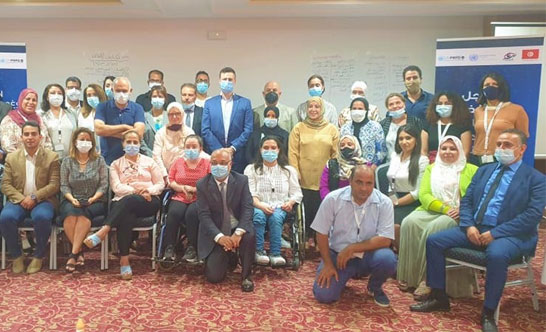Zoom On
Towards a better access for people with disabilities in Tunisia to rights and services

Graduation
As part of the promotion of the application of the convention on the rights of persons with disabilities in Tunisia, UNFPA, UNESCO, UNDP and OHCHR, in collaboration with the General Directorate for the Promotion of Persons with Disabilities and IBSAR Association, organized from June 14 to 18, 2021 in Tunis, a training on "Cross-cutting approaches and prerequisites for development taking into account the issue of disability", targeting representatives from the government, parliament, civil society organizations, organizations of people with disabilities, as well as United Nations agencies in Tunisia.
The objective of this training is to provide a basic introduction to the Convention on the Rights of Persons with Disabilities, the Sustainable Development Goals (SDGs) integrating the issue of disability and the preconditions for integration.
The training was organized as part of a project that aims to:
- • Promote the application of the Convention on the Rights of Persons with Disabilities in Tunisia by emphasizing the preconditions necessary for the integration of persons with disabilities in all sectors in order to elaborate concrete policies, programs or services, which will enable systemic change through a cohesive, cross-sectoral approach.
- • Increase and strengthen the implementation of the disability-inclusive SDGs at the national level by providing essential support to the collective United Nations response to the SDGs so that national priorities and gaps relating to persons with disabilities can be addressed and taken into account in national planning.
Following discussions between the various participants during the five days of training, a set of recommendations was formulated in connection with the philosophy, structure, general principles and measures for implementing the convention on the rights of persons with disabilities, namely the revision of the law on the basis of the provisions of the convention and the adoption of a human rights based approach and on the principles of equality and non-discrimination (ii) the revision of the definition of persons with disabilities (iii) the revision of all laws to ensure the elimination of all forms and types of discrimination against persons with disabilities (iv) the implementation of law on accessibility (v) the application of the principle of inclusive design of physical and virtual spaces in policies, laws, standards and other measures, including monitoring of the implementation / respect of national commitments (vi) the systematization of the collection of data that is disaggregated by sex, age and type of disability (vii) the identification of indicators on all types of disability so that they can be used consistently in monitoring the implementation of the 2030 Agenda for SDGs (viii) the establishment of permanent consultation mechanisms with organizations of people with disabilities (ix) the collaboration with organizations of people with disabilities who represent women and girls with disabilities by ensuring their direct participation in all public decision-making processes in a safe environment, in particular with regard to the development of policies related to women's rights, gender equality and violence against women.
And many other recommendations that will be used to develop specific action plans that will be implemented as part of the project starting by the end of year 2021.
